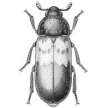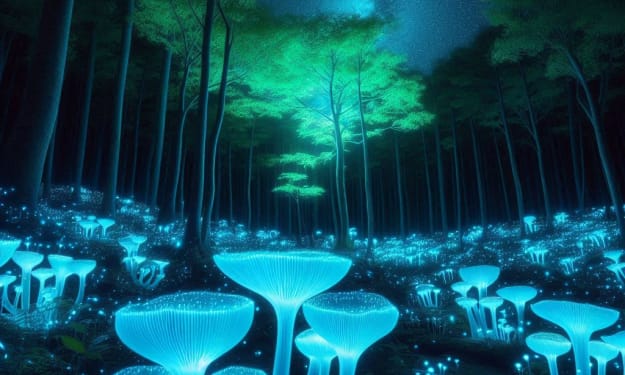
Outside, the wind beat itself against the clusters of huts huddled together against the sea. It battered the fat snowflakes into a white blur as they fell, made the air thick with their frenetic motion. It seemed to cry a question when it moaned, lonely, between the places where people gathered together away from its reach.
Inside, a fisher sat near a fire. She held a net, and a shuttle carved from bone. The shuttle darted in and out of the web of fine rope, adding strands to repair damage done in the months before the cold wind came to mourn its way through winter. She paused to stir the fragrant contents of a pot which hung over the fire. With a deep wooden ladle she dipped some stew into a bowl and passed it to a child who sat at the low table with her.
The net she held was nearly finished, but there were others to mend, as well. There was plenty of time to fix them all over the winter months, but tonight she had an affinity for the work, and would likely continue until her eyes ached and her hands grew sore. The spring would see her nets in use again, out in the water of the sheltered bay, where they were rarely troubled by large waves. The memory of blue skies over sleek bodies cutting swiftly through clear water made her smile.
Last year, a herd of seals found their way into the cove, and entertained them all for a few short weeks. The human fishers had thanked the seals for sharing the sea, and threw them some of each day’s catch. They moved on when the wind changed. She hoped they would return. She bent to her work once again.
The child was tired. Her day had been a busy one. The youngest inhabitants of the village loved to skirt the icy crust along the shore together, examining what the sea had left on the beach during the previous night. Long strands of seaweed were gathered and chopped for an impromptu lunch alfresco. Each piece of plastic was carefully collected and placed in one of the bins along the beach. Shells and pebbles were pressed into the huge ever-evolving complex of sand sculptures at the farthest edge of the beach, beyond the reach of the tide. The stories they told each other every day grew and changed, as well. Sometimes the sea held monsters, tangled in the weedy depths, pining for their lost children who had come to live on land among the people. Any one of them could be the child of such a monster, destined to be dragged back into the ocean by their terrible mournful parents. Sometimes the sea itself was alive and reached for their heels as they ran laughing up and down the beach, taunting its waves. Always, the wind was alive. It pressed against their backs as they walked slowly home, selflessly urging them to hurry. It washed over their faces in the morning, caressing them in greeting after its long night alone.
She inhaled the steam that rose from the bowl and sighed with contentment. “Will you tell me a story while I eat?”
The fisher nodded. “Sure. Gimme a minute.” She put aside the net and scooped her own bowl of stew. “You don’t mind if I talk with my mouth full, right?” She winked at the girl, who grinned.
The woman gathered her thoughts. “Let’s see.”
The girl watched with anticipation as her mother’s face settled into a familiar expression, a storyteller’s face full of wisdom and mystery. Her voice somehow took on a grander tone as she began, imparting the knowledge of generations past, a priestess bestowing the gifts of the gods. Her bowl stood steaming, untouched, and despite her joke the girl knew her mother would never take a bite while she was weaving words.
“Tonight, the wind reminds me of a story the old ones used to tell, about a man in ancient times. The man who forgot the wind.”
The little girl had never heard this one before, and listened raptly as the scene unfolded.
“There was a man in ancient times who had forgotten the wind, and never touched the earth. He lived in a building so tall it towered over the tallest trees. It was like a cliff of metal and glass, full of people’s homes. They could stand at their windows and look out at the world beyond the glass, and never need to go outside. Every morning, the man ate food that he got out of a box, or a plastic container, milk from a jug. After a nearly tasteless breakfast, most mornings he went down, underground, beneath the building that was like a cliff, and he climbed into a vehicle made of glass and metal.”
“A car!” The girl shouted, delighted to be able to supply the word.
“Yes. When he drove the car out of the depths, into the street outside, he was still inside a shelter. When he needed food, he would drive the car to a market, leave it underground, and go upstairs to buy food, never walking outdoors. He never ate anything he had grown, or made, or caught with his own hands. So, most mornings after breakfast, he would drive his car to another place where he did his work to make money. He would drive through the streets with many other people in many other cars, and they all had to watch out for each other, and obey the lights along the streets, so that they didn’t crash into each other. A red light meant they had to stop, a green light meant they could continue. They did this in any weather, rain, sun, snow, and were safe from the elements inside their shells of glass and metal. The man would drive his car under the tall building where he did his work, and go up inside it, to do whatever he did all day long. The old ones couldn’t say what it was that he did in that place. They had forgotten, and they said it was unimportant, in any case. The man did this for years, in perfect happiness. One day, his car didn’t work- it was broken. The man couldn’t fix it, yet he knew he had to get to the other building where he did his work, or he would be dismissed from his job.”
“And then he wouldn’t make any money? And he wouldn’t be able to buy food? And he didn’t grow any food?”
“Yes, you see the problem.”
The girl nodded wisely.
“The man decided he would walk to the building. It was a fine day, and for the first time in many years, he stepped outside into sunshine and wind. At first, as he walked, the man was happy, overjoyed. The sun felt wonderful on his face, the breeze was delicious. It ruffled his hair and tickled him, stroked his cheek, and reminded him of his childhood, the last time he had known the wind. He took a shortcut, through a place where trees and grass grew. The soil beneath his feet was as soft as the breeze, and there was a bush along his path that held out berries for him to pluck. He put one in his mouth. It was delicious, and he began to feel a strange sadness. When he reached his destination, he realized that he had arrived early. It had taken him less time to walk than to wait in the sea of cars as the lights on each street corner changed slowly from red to green. He had seen beautiful flowers along the way, tasted unexpected fruit, felt the grass underfoot, and the wind in his hair. Then he cried into his hands, and wondered why he had lived his life without these things for so very long.”
The little girl absorbed this silently as she ate. Her mother picked up her own spoon. The bowl of stew had cooled to the perfect temperature, and she ate slowly with her daughter. Almost eleven years old. She tried to imagine what impression the story made on this child who had never seen streets, or used money. When she herself was a child, she was no different, and this story had comforted her. She had everything the man realized he lacked, and was made more grateful for it.
“What do you think of this story?”
“It’s sad,” she replied immediately, “but also has hope. The man met the wind again.”
“Yes.”
She thought for a while longer, chewing. “Is something missing from our lives, mama?”
The woman considered the question. “Do you feel like something is missing?”
Her small shrug was confused. “I don’t know. The man was happy. He didn’t know he was missing anything until he went outside. Why do we live the way we do?”
“Ah, I see. ‘Why’ may be the easiest question to ask, but the hardest to answer. Perhaps you can gather your own answers. I’ll gather mine, and we’ll share them another day.”
She nodded, but the woman could see the girl was not satisfied by her response. Perhaps her daughter would forget these questions as the days passed, and the need for answers would fade. Somehow, though, she doubted it. She saw this night as if through a lens, looking backward from a distant future, and wondered what sort of life the girl would make for herself in the years to come. As the fisher took up her net again, and the sound of the wind briefly swelled, she reminded herself that a question can be a sad and wonderful thing. Sometimes the answer was in the asking.
About the Creator
Enjoyed the story? Support the Creator.
Subscribe for free to receive all their stories in your feed. You could also pledge your support or give them a one-off tip, letting them know you appreciate their work.






Comments
There are no comments for this story
Be the first to respond and start the conversation.